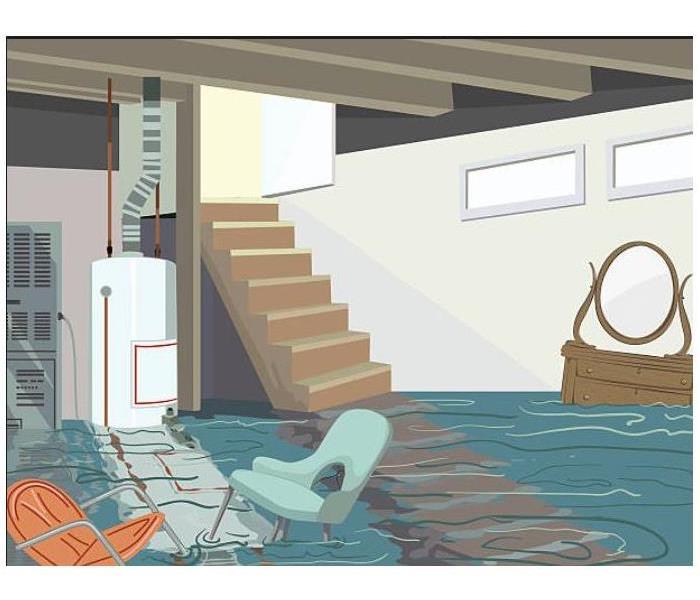Top 5 Reasons for Water Damage in Your Riverside Home
2/4/2019 (Permalink)
 Call your neighbors at SERVPRO of West Riverside City if you have water damage or flood damage 951-351-8033
Call your neighbors at SERVPRO of West Riverside City if you have water damage or flood damage 951-351-8033
Discovering that your home was destroyed by a leak or a flood can be devastating, and repairing water-damaged walls and floors are often very expensive.
Water damage and freezing issues were the third most common reason for a homeowner’s insurance claim between 2011 and 2015 with an average payout per claim of $8,861.
Plumbing Issues
Water damage is often caused by plumbing issues. That’s why it’s important to inspect the plumbing systems in your home at least once a year to ensure that there aren’t any problems with hoses or pipe joints. You should also keep in mind that plumbing pipes have a long lifespan. Brass pipes can last for as many as 70 years while copper pipes can last for more than 50 years. The average lifespan for galvanized steel pipes is often between 20 and 50 years.
Drain pipes are usually made of either cast iron (which can last for as many as 100 years) or polyvinyl chloride (PVC). Properly maintained PVC pipes can last indefinitely. Check your home inspection report or consult a licensed plumber to learn about the lifespan of the plumbing pipes in your home.
If your water bill is unusually high, that might be an indication of an undetected leak. Buying a water leak sensor that sends alerts to your phone is one way to safeguard your home. You should also check around your toilets, tubs, showers and sinks for any soft spots or moisture. Keep an eye out for loose tiles as well. If you have a dishwasher or a refrigerator with a water line, look for warped or discolored floorboards.
Washing Machine Leaks
Unless you’re doing laundry, you probably don’t think twice about your washing machine. But if it breaks down, the results could be catastrophic. For example, if the supply hose is damaged or has a faulty connection to the wall or washing machine, more than 600 gallons of water could potentially spill out within an hour. That could lead to significant water damage, especially if your washing machine is located on the second floor of your home.
To prevent water damage, you should replace your washing machine supply hose at least once every five years. Also, resist the temptation to overload your washing machine. Constantly stuffing too many clothes into your washing machine could loosen gaskets and valves or cause cracks. Take good care of your washing machine and your washing machine will take good care of you.
Bursting Water Pipes
During severely cold winters, pipes can freeze over and burst. That’s more likely to happen if you have certain types of pipes, such as swimming pool supply lines, water sprinkler lines and pipes with minimal insulation that run against exterior walls.
If temperatures tend to freeze in your area, be sure to protect your pipes. Insulate both hot and cold water pipes using heat tape or pipe sleeves available in your home improvement store. If you have water supply lines in your garage, keep the garage door closed as often as possible. Open kitchen and bathroom cabinet doors to allow warmer air to circulate. If you plan to spend some time away from your home, leave the heat on and set your thermostat to at least 55 degrees. You can’t control the weather, but you can put up a good fight to save your pipes.
Aging Water Heaters
Water heaters have a shelf life. You could wait until your water heater starts leaking to replace it. But if you’re being smart about avoiding water damage, you should replace it every 10 years. A tankless water heater can last for as many as 20 years.
You can find out how old your water heater is by looking up the serial number on the manufacturer’s sticker near the top of the water heater. Make sure to regularly inspect your water heater to check for signs of moisture build-up, mold or corrosion. If your water isn’t as hot as it used to be or there’s rust coming from your faucets, it’s time to call a plumber or water heater specialist.
Inclement Weather
Snow may look lovely. But if your home is not weatherproof, a bad snowstorm could damage your roof, walls and ceiling. Make sure your home is ready for inclement weather by ensuring that your rain gutters and downspouts are clean. You should also check doors and windows to ensure that your caulking hasn’t cracked.
If it snows where you live, be wary about the formation of ice dams on your roof. This happens when the heat inside your home causes water to melt in the middle of your roof. The water then refreezes near the edges, forming a dam that prevents melting snow from draining off the roof. The water that backs up can leak into your home and damage ceilings, walls and other areas of your home. To prevent ice dams from forming, insulate your attic to keep heat from rising and reaching the roof.
Roofs should be inspected annually. A professional roof contractor can look for exterior and interior warning signs that your roof’s condition may lead to water damage, including cracked or missing shingles and areas where water is prone to pool. An inspection can cost several hundred dollars, but in exchange for your peace of mind, it’s priceless.






 24/7 Emergency Service
24/7 Emergency Service